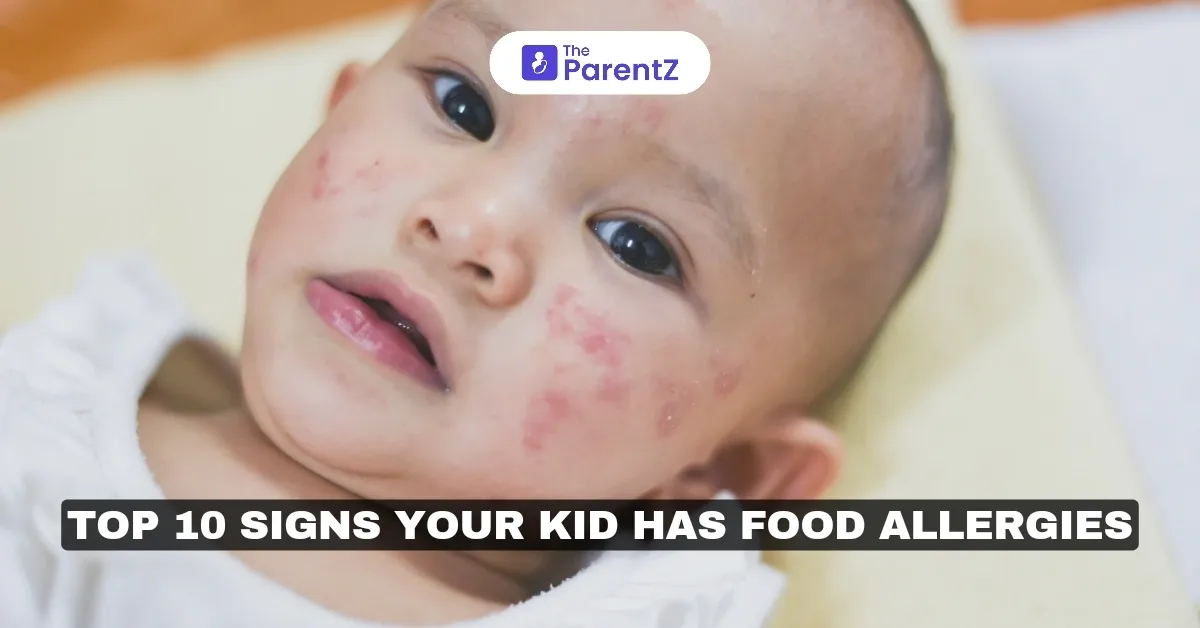As parents, it's common to get concerned about your child’s health. And food allergies are something that requires a little extra attention. Lately, food allergies have significantly been prevalent, especially in children. According to a study, nearly 8 percent of kids in the U.S. suffer from some kind of food allergy.
Typically, food allergies occur when the immune system mistakenly identifies certain food proteins as harmful, triggering a range of physical reactions. The symptoms can vary from mild to severe, and in rare cases, it can be life-threatening.
Therefore, early recognition of signs of food allergies leads to effective management to ensure kids’s safety.
Read this article to learn about the top ten signs to show your child might have a food allergy.
Top ten signs to show your child might have a food allergy
From skin reactions to nausea, here is a list of the top ten signs to recognize when it comes to food allergies in kids.
Skin Reactions: Rashes, Hives, or Eczema
Skin is the first battleground for food allergies. If your child suddenly breaks out in a rash, hives, or even experiences flare-ups of eczema after eating certain foods, there’s something to look out for. In the majority of cases, it’s the body's way of indicating something’s not right.
Did you know that according to the CDC, food allergies affect around 8% of children in the U.S. and eczema? It’s often associated with allergies, especially in infants. Take special attention if you notice red rashes immediately after having food.
Stomach Issues: Cramping, Diarrhea, or Vomiting
If your child consistently experiences stomach pains, diarrhea, or vomiting after eating, there are high chances of having an allergic reaction. Sometimes, the symptoms of gastroenterological issues may coincide with food allergies. However, gut doesn't lie. If you notice discomfort to more severe reactions like vomiting or diarrhea., there’s a high possibility that a food allergy has triggered it, especially if it happens regularly after meals.
Swollen Lips, Tongue, or Face
Swelling of the lips, tongue, or even the face is another sign to indicate something is off. A swollen face or tongue could signal an allergic reaction and must be given immediate medical attention.
In severe situations, this can also be a sign of anaphylaxis, a life-threatening allergic reaction. According to research, food allergies are the most common cause of anaphylaxis in children, and any swelling must be addressed immediately.
Runny Nose, Sneezing, or Coughing
If your child constantly sounds like they have a cold after eating, it may not be the common cold but a food allergy. Sneezing, a runny nose, coughing, or even wheezing after meals can be a sign that something in their diet is triggering an allergic response.
Fatigue or Lethargy
If your child seems unusually tired after eating, it's probably because food allergies drain energy faster. If your child experiences excessive tiredness, fatigue, or a sudden drop in energy levels after meals, it may be a result of an allergic reaction. While fatigue is not an obvious sign, it is certainly something to look into more importantly due to the fact that when your immune system is on high alert, it takes a toll on the body, leaving no energy for other activities.
Difficulty Breathing
Wheezing, coughing, or difficulty breathing after eating certain foods is a serious indication. In some cases, food allergies can even trigger asthma-like symptoms, resulting in breathing difficulties in kids. In fact, the CDC states that kids having food allergies have two times higher chances of suffering from asthma. So if you notice your child struggling to breathe or making whistling sounds after eating, it is recommended to consult your doctor immediately.
Frequent Itching, Especially Around Mouth
If your child is constantly scratching around their mouth or throat after meals, it could be a sign of an allergic reaction, especially if it happens frequently after eating certain foods like peanuts, eggs, or dairy.
This itching can also be referred to as Oral Allergy Syndrome, a condition where the body mistakes certain food proteins for pollen proteins, leading to discomfort.
Behavioral Changes
After eating certain foods, if you notice your child showcasing some behavioral changes, it's probably because food allergies can also sometimes affect mood and behavior. From sudden irritability to feeling unusually anxious or hyperactive, this could mean an allergic reaction to certain triggers.
Nausea or Bloating
If your child frequently complains of feeling nauseous or bloated after eating, food allergies may be the reason behind such symptoms. According to Food Allergy Research & Education (FARE), gastrointestinal issues are among the most common symptoms of food allergies in children. Besides, persistent nausea, stomach cramps, or bloating are other common signs that indicate food allergies in children.
Anaphylaxis
It is the most severe consequence of food allergies that can even prove to be life-threatening. The primary symptoms include difficulty breathing, swelling of the throat, a rapid drop in blood pressure, and loss of consciousness. This is an emergency response when your kid’s body is seriously allergic to a certain food item. If you suspect any signs of anaphYlaxis, it is important to consider immediate medical care.
Takeaway
When it comes to ensuring your child’s safety, it is essential to recognize any signs of food allergies at an early phase. From a minor reaction to severe allergic reaction resulting in anaphylaxis, it is important to know some of the most common signs of food allergies in kids.








Be the first one to comment on this story.